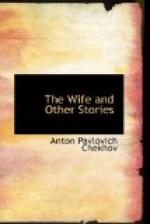“Illness has nothing to do with it,” Katya interrupts me; “it’s simply that your eyes are opened, that’s all. You have seen what in old days, for some reason, you refused to see. To my thinking, what you ought to do first of all, is to break with your family for good, and go away.”
“You are talking nonsense.”
“You don’t love them; why should you force your feelings? Can you call them a family? Nonentities! If they died today, no one would notice their absence tomorrow.”
Katya despises my wife and Liza as much as they hate her. One can hardly talk at this date of people’s having a right to despise one another. But if one looks at it from Katya’s standpoint and recognizes such a right, one can see she has as much right to despise my wife and Liza as they have to hate her.
“Nonentities,” she goes on. “Have you had dinner today? How was it they did not forget to tell you it was ready? How is it they still remember your existence?”
“Katya,” I say sternly, “I beg you to be silent.”
“You think I enjoy talking about them? I should be glad not to know them at all. Listen, my dear: give it all up and go away. Go abroad. The sooner the better.”
“What nonsense! What about the University?”
“The University, too. What is it to you? There’s no sense in it, anyway. You have been lecturing for thirty years, and where are your pupils? Are many of them celebrated scientific men? Count them up! And to multiply the doctors who exploit ignorance and pile up hundreds of thousands for themselves, there is no need to be a good and talented man. You are not wanted.”
“Good heavens! how harsh you are!” I cry in horror. “How harsh you are! Be quiet or I will go away! I don’t know how to answer the harsh things you say!”
The maid comes in and summons us to tea. At the samovar our conversation, thank God, changes. After having had my grumble out, I have a longing to give way to another weakness of old age, reminiscences. I tell Katya about my past, and to my great astonishment tell her incidents which, till then, I did not suspect of being still preserved in my memory, and she listens to me with tenderness, with pride, holding her breath. I am particularly fond of telling her how I was educated in a seminary and dreamed of going to the University.




